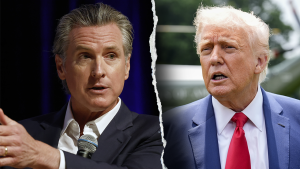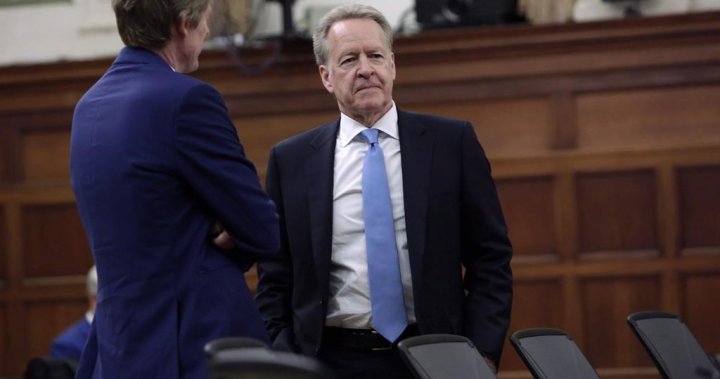Paragraph 1: The Brewing Trade Dispute and Canada’s United Front
The year is 2025, and the familiar drumbeat of trade tensions between Canada and the United States echoes once again. U.S. President Donald Trump, seemingly resurrecting a page from his earlier playbook, threatens to impose a sweeping 25% tariff on all Canadian imports. This aggressive move sends shockwaves through the Canadian economy and prompts Prime Minister Justin Trudeau to rally the premiers in a show of national unity. The message from Ottawa is clear: Canada will respond with a unified front, potentially deploying retaliatory measures across various economic sectors. This united stance signals a willingness to engage in a comprehensive and forceful response to protect Canadian interests.
Paragraph 2: Alberta’s Dissenting Voice and the Cracks in Unity
While most premiers align with Trudeau’s call for a united front, Alberta Premier Danielle Smith emerges as a dissenting voice, challenging the wisdom of a tit-for-tat tariff war. Smith argues that threatening the U.S. with retaliatory tariffs, especially in the energy sector, is a dangerous game. Instead, she advocates for a more conciliatory approach, emphasizing the need to find common ground and de-escalate the situation. This divergence in opinion creates a fissure within the Canadian ranks, potentially weakening the country’s negotiating position. Alberta’s unique position as a major energy supplier to the U.S. fuels Smith’s concerns, as retaliatory measures in this sector could have significant economic repercussions for her province.
Paragraph 3: Verheul’s Criticism and the Erosion of Canada’s Bargaining Power
Steve Verheul, Ottawa’s former chief trade negotiator, weighs in on the escalating trade dispute, sharply criticizing Alberta’s stance. He argues that Premier Smith’s public dissent has undermined Canada’s efforts to present a united front and has weakened the country’s bargaining position. By openly breaking ranks with the other premiers, Alberta sends a signal of internal division to the U.S., potentially emboldening the Trump administration to press its advantage. Verheul’s assessment highlights the importance of a unified front in international trade negotiations, where even perceived cracks in solidarity can be exploited by the opposing party.
Paragraph 4: Saskatchewan and Quebec Join the Chorus of Dissent
The cracks in Canada’s unified front widen as Saskatchewan Premier Scott Moe and Quebec Premier François Legault express reservations about targeting energy exports with retaliatory tariffs. Moe voices his "issue with" such a measure, while Legault insists that any decision to impose tariffs on energy exports should require the explicit consent of the provinces. These additional voices of dissent further complicate the situation for Trudeau and raise questions about the feasibility of a cohesive national response. The growing chorus of dissent reinforces the challenges inherent in formulating a unified trade policy in a federation like Canada, where provinces have distinct economic interests and priorities.
Paragraph 5: The Implications of a Divided Front for Canada’s Trade Strategy
The growing divisions among the premiers create a dilemma for the federal government. A united front projects strength and resolve, making it more difficult for the U.S. to dismiss Canada’s concerns. However, a fragmented approach weakens Canada’s negotiating leverage and risks sending conflicting signals to the U.S. The internal debate over retaliatory tariffs also raises complex questions about the balance of power between the federal government and the provinces in matters of international trade. The situation underscores the need for effective intergovernmental communication and coordination to develop a coherent and impactful trade strategy.
Paragraph 6: The Uncertain Future of Canada-U.S. Trade Relations
As the trade dispute unfolds, the future of Canada-U.S. trade relations hangs in the balance. The outcome will depend not only on the actions of the U.S. administration but also on Canada’s ability to navigate its internal divisions and present a clear and unified position. The debate over retaliatory tariffs, particularly in the sensitive energy sector, will continue to shape the discussions and influence the ultimate outcome. The potential for escalating trade tensions carries significant economic implications for both countries, underscoring the need for a carefully calibrated and strategic approach to resolving the dispute.










